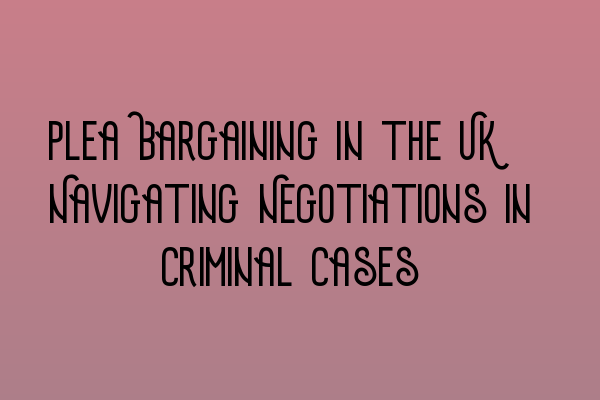Plea Bargaining in the UK: Navigating Negotiations in Criminal Cases
As a solicitor practicing criminal law in the UK, it is crucial to understand the intricacies of plea bargaining and how to effectively navigate negotiations in criminal cases. Plea bargaining is a process that allows for the negotiation and resolution of criminal charges, often resulting in a reduced sentence or lesser charges for the defendant. In this article, we will explore the ins and outs of plea bargaining in the UK legal system.
Before delving deeper into the topic, it’s essential to understand the legal framework surrounding plea bargaining in the UK. Criminal cases in the UK are primarily governed by the Criminal Justice Act 2003 and the Consolidated Criminal Practice Direction, which outline the procedures and guidelines for plea negotiations.
Why exactly do plea bargains occur? In many instances, both the prosecution and the defense may see value in reaching a plea agreement. The prosecution may aim to secure a conviction without the need for a lengthy trial, while the defense may seek a reduced sentence or lesser charges for the defendant. Plea bargaining can also help alleviate the burden on the courts by resolving cases more efficiently.
It’s crucial to note that plea bargains are voluntary and must be made with full knowledge and understanding of the charges and potential consequences. It is also essential that the defendant’s rights are protected throughout the negotiation process, ensuring fair treatment.
When it comes to plea bargaining in criminal cases, there are different types of agreements that can be reached. A common form is charge bargaining, where the defendant agrees to plead guilty to a lesser charge in exchange for dropping more severe charges. Another type is sentence bargaining, in which the defendant pleads guilty in exchange for a reduced sentence or other favorable conditions.
One key aspect of successful plea bargaining is effective negotiation skills. As a solicitor, it is vital to have strong communication and negotiation skills to advocate for your client’s best interests. This includes understanding the strengths and weaknesses of the case, identifying possible mitigating factors, and presenting compelling arguments to the prosecution.
In order to navigate plea negotiations effectively, it is essential to stay updated on the latest developments and precedents in criminal law. Continued legal education and professional development, such as attending SQE workshops and webinars, can provide valuable insights and strategies to enhance your negotiation skills.
It’s also important to recognize the potential risks and drawbacks of plea bargaining. While it can result in favorable outcomes for both the defendant and the prosecution, there is always the risk of an unfavorable agreement or the perception of an unjust outcome. As a solicitor, you must carefully evaluate each case and advise your client on the best course of action.
In conclusion, plea bargaining plays a significant role in UK criminal cases, providing an opportunity for negotiated resolutions while reducing the burden on the courts. As a solicitor, mastering the art of plea negotiations is essential to effectively advocate for your clients. By staying informed, honing your negotiation skills, and understanding the legal framework, you can navigate plea bargaining with confidence and achieve the best possible outcomes.
For further information on related topics, we recommend the following articles:
- LLC Formation Made Simple: Step-by-Step Guide for UK Entrepreneurs
- Business Regulations in the UK: A Comprehensive Overview
- SQE Workshops and Webinars: Accelerate Your Exam Preparation
- Delaware Corporate Law for UK Solicitors: Key Insights and Practices
- Demystifying the Solicitors Qualifying Examination Format
